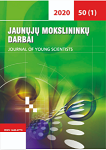PROJEKTINĖ VEIKLA NEFORMALIAJAME MUZIKINIAME UGDYME
PROJECT ACTIVITIES IN NON-FORMAL MUSIC EDUCATION
Author(s): Dovilė MiknaitytėSubject(s): Music, Present Times (2010 - today), Sociology of Education, Pedagogy
Published by: Vilniaus Universiteto Leidykla
Keywords: non-formal children’s education; project activity; music education project; self-expression;
Summary/Abstract: Children’s music activities are one of the most significant tools developing the basics of music culture. The educational process cannot be limited to the development of musical knowledge, skills and hearing. Music activity in general education schools must be treated as children’s specific cultural expression that develops their aesthetic consciousness. Children non-formal education is an integral part of the Lithuanian education system. The purpose of non-formal music education is to develop musical abilities, to satisfy children‘s need for cognition, education and self-expression. A wide range of tools and methods can be used to achieve such goals, one of which is project-based activity. Project-based activity has received special attention in recent years, as it is the way of using and applying knowledge in educational practice. There is a noticeable lack of research into the possibilities of non-formal music education in project-based activity. A music education project is an opportunity to implement identified music education ideas and to tackle particular music education development problems by suggesting new music activity methods and forms. In 2018–2019 a music education project implemented and the musical “Melagės sapnas” (“The Liar’s Dream”) was staged. Project participants – 1-8 form students. The aim of the project was to promote children’s self-expression in music in music project activity. The objectives of the project were to foster children’s self-expression through music activity, help them gain music knowledge, encourage them to actively take part in rehearsals and performances, engage them in music activity, promote their self-expression and creativity on the stage. Thus, non-formal music education is one of the most suitable tools for developing musicality, individuality, self-expression and creativity; the project method contributes to the development of independence, creativity, initiative and a sense of responsibility in children.
Journal: Jaunųjų mokslininkų darbai
- Issue Year: 2020
- Issue No: 1 (50)
- Page Range: 24-29
- Page Count: 6
- Language: Lithuanian

